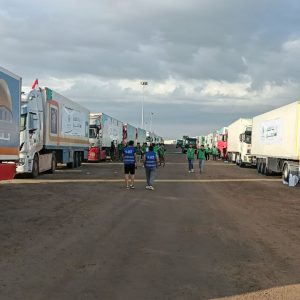Families of missing persons form human chain in Bangladesh
DHAKA, Bangladesh (AA): Adiba Islam Ridhe, now 12, was only 2 years old when her father, a leader of the student wing of Bangladesh Nationalist Party, went missing.
She says her heart aches to see fathers dropping her friends to school every morning. “I have been dreaming the same for the last decade,” she told Anadolu in Bangladesh’s capital Dhaka.
The girl on Saturday addressed a human chain outside Dhaka’s Press Club to mark the International Week of the Disappeared observed across the world in the last week of May (May 26-31).
Ridhe was only 2 years old when her father, Parvej Hossain, a mid-level leader of the student wing of Bangladesh’s main opposition political party, Bangladesh Nationalist Party (BNP), went missing.
His family claims the country’s law enforcers picked him from Dhaka’s Shahbag area, a major transport hub, in 2013, shortly before the 2014 general elections in the South Asian nation.
“I can’t express how painful it’s for me to wait every moment with the hope that one day my father will come to me and I will embrace him as others do. But it has been 10 years and there is no end to my waiting,” Ridhe said.
Her younger brother stood at her side holding a picture of their father.
The speakers at the program said 623 people, mostly men from the opposition party, were the victims of enforced disappearance under the Awami League government since 2009.
‘Let us give him a proper burial’
Korshed Alam Mintu, another victim attending the event, said: “We still don’t know the whereabouts of my brother. If they killed my brother, please return his body. At least let us give him a proper burial.
Chowdhury Alam, his brother, was picked up in June 2010. He was an active leader of the BNP.
Dozens of the family members joined the human chain carrying photos of their loved ones who are missing.
“We have seen that the international communities are also serious about the enforced disappearances in Bangladesh. We are hopeful that it’s not far away and we will see the punishment of those who forcefully [sic] disappeared our dear ones violating the law,” Afroza Islam Akhi, sister of another victim, Sajedul Islam Shumon, told Anadolu.
She added that her brother went missing in December 2013.
Human Rights Watch, in a 57-page report in 2021, titled “Where No Sun Can Enter: A Decade of Enforced Disappearances in Bangladesh” noted that despite credible and consistent evidence that Bangladesh security forces routinely commit enforced disappearances, the ruling Awami League has ignored calls by donor governments, the UN, human rights organizations, and civil society to address the culture of impunity.
“United Nations human rights experts should lead an independent international investigation into enforced disappearances by security forces in Bangladesh,” the report recommended.
The top government officials including the home minister, however, have denied the allegations at different public functions, claiming that people sometimes willingly hide themselves due to various grounds including domestic discords or to avoid charges after committing crimes.










